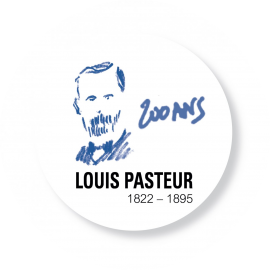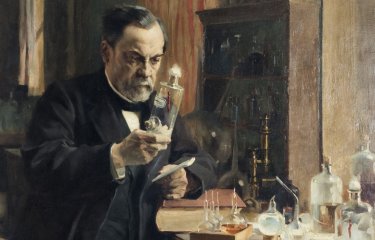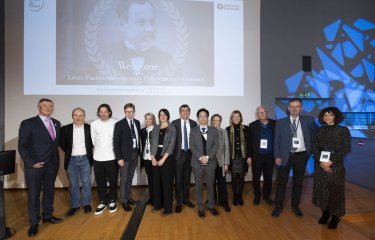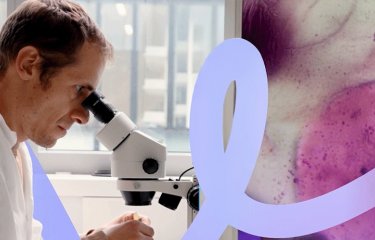Louis Pasteur was born on December 27, 1822. He was an international figure in scientific and medical research and the founder of the Institut Pasteur (Paris) in 1887. Louis Pasteur was a precursor of a certain way of conducting research, deeply concerned with its goals, both humanistic and universal, and the need to train and transmit this approach and these values to future generations. Today, this "Pasteur spirit" still inspires scientists who work in the institute that bears his name (Institut Pasteur), as well as those in the wider Pasteur Network.
In 2022, the Institut Pasteur will celebrate the life and work of Louis Pasteur, the man and the scientist. By the end of the 19th century, with the creation of the Institut Pasteur on the horizon, his scientific work, but also his convictions in science, on how to conduct research as well as on its aims for society, laid the foundations for what would become a great scientific school of the 20th century.
Three dimensions characterize this school:
- formatting rigorously the scientific approach, based on study, rigor, critical thinking, proof through experimentation, perseverance;
- firm beliefs about the humanistic and universal place, role and purposes of science, in society and in the world, that is to say - at the risk of sounding utopian - dedicated to improving everyone’s health, everywhere in the world;
- finally, the desire to transmit to future generations, not only scientific knowledge, through education and training, but also this way of "conducting research" with the concern to improve human health.
This "Pasteur spirit" is composed of these three ambitions, driven by scientific and humanistic convictions, whose missions could be summarized as follows:
- understanding the living world;
- improving health for all people;
- passing on to future generations.
This legacy of Louis Pasteur is also partly that of his "lieutenants" - that is to say the first circle of scientists who founded with him the Institut Pasteur and who led its development between the end of the 19th and the beginning of the 20th century -. It has its origin in the discoveries made by a man who was a chemist by training, in fields as wide-ranging as biology, agriculture, medicine and hygiene, and culminating in the development of the rabies vaccine, in 1885. Louis Pasteur's discoveries revolutionized the scientific, medical and industrial communities and led to the creation of the Institut Pasteur in June 1887 and its inauguration on November 14, 1888, and then its rise.
Since then, several generations of scientists have made this heritage their own and have been able to maintain, bring to life and pass on the "Pasteurian spirit."
Story of Louis Pasteur and the Institut Pasteur
Celebrating the bicentenary together
Scientists, artists, associations, local authorities and institutions will be taking the opportunity of this commemorative year to showcase Louis Pasteur's legacy alongside the Institut Pasteur.
A general steering committee has been set up to promote their involvement. It is coordinated by the French Academy of Sciences with the Institut Pasteur, and its members include a number of prestigious partners: the École normale supérieure, the Institut Pasteur de Lille, the Académie française, the French National Academy of Medicine, the French Veterinary Academy and the French Academy of Agriculture.
A special quality label designed for this commemoration

The bicentenary is inscribed by "France Memory" in the 2022 calendar of national commemorations
The bicentenary of Louis Pasteur's birth in 2022 has been officially recognized as a national commemoration by the "France Memory" department at the Institut de France (France Mémoire [in French]).
A dedicated website: pasteur2022.fr
A large number of initiatives, events and activities have already been given the general committee's seal of approval for 2022. To find out more, head to the dedicated website, pasteur2022.fr (in French).
Selected highlights:
- February 7, 2022: La Poste will be issuing a stamp featuring a portrait of Louis Pasteur.
- July 9, 2022: the 8th stage of the 2022 Tour de France will start in Dole, Louis Pasteur’s birthplace.
- December 7, 2022: a conference on major epidemics will be held, organized by the Institut Pasteur and the French Academy of Sciences and open to all. The conference will explore the major epidemics that have affected human populations. Animal epidemics will also be discussed.
Learn more: Pasteur 2022 Agenda (in French)
There will also be a number of books about Louis Pasteur published in 2022.
- Several biographies are in preparation, including an illustrated book: Pasteur. The man and the scientist, by Annick Perrot and Maxime Schwartz, to be released on February 10, 2022
- Comic album, L'Ara de Rosa – Les microbes, Éditions du Sabot Rouge.
Louis Pasteur and Edmond Nocard lead an investigation at the château belonging to Rosa Bonheur, a painter of animals who was also born in 1822.
Learn more: Pasteur 2022 Latest news (in French)
For more information, please visit





